人教版(2019)必修第一册Unit 4 Natural Disasters Reading and thinking课件-(共27张PPT)
文档属性
| 名称 | 人教版(2019)必修第一册Unit 4 Natural Disasters Reading and thinking课件-(共27张PPT) |

|
|
| 格式 | pptx | ||
| 文件大小 | 6.6MB | ||
| 资源类型 | 教案 | ||
| 版本资源 | 人教版(2019) | ||
| 科目 | 英语 | ||
| 更新时间 | 2024-04-17 00:00:00 | ||
图片预览

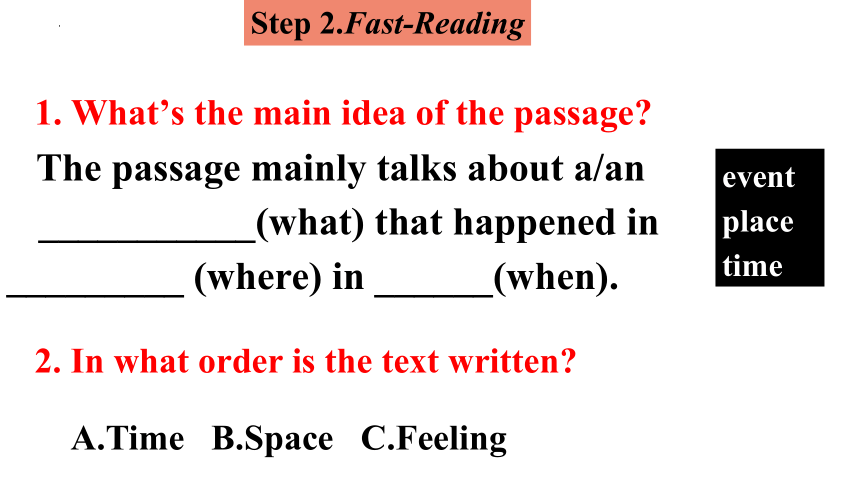
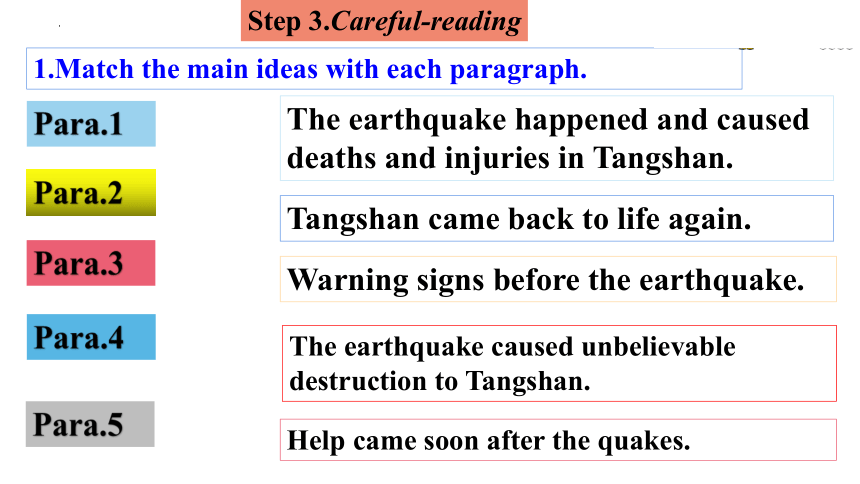
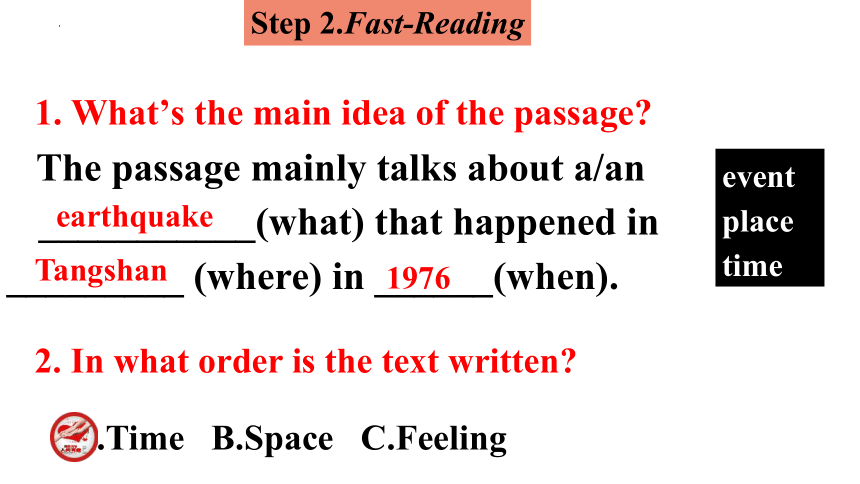
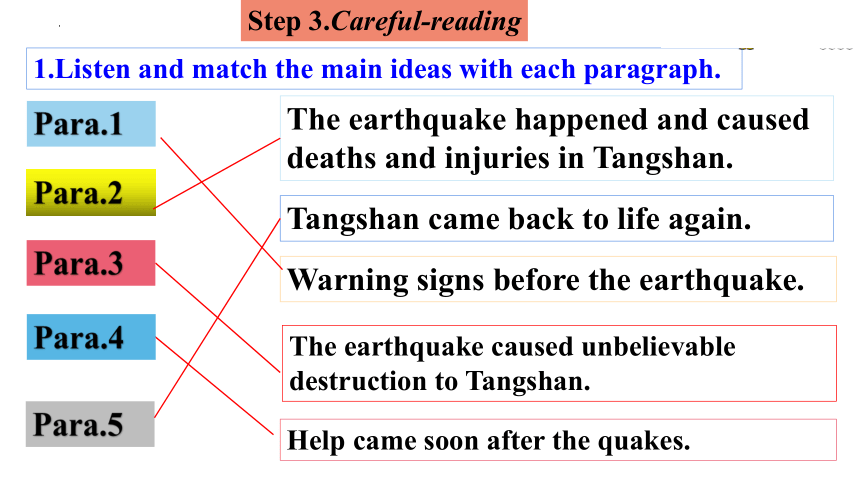
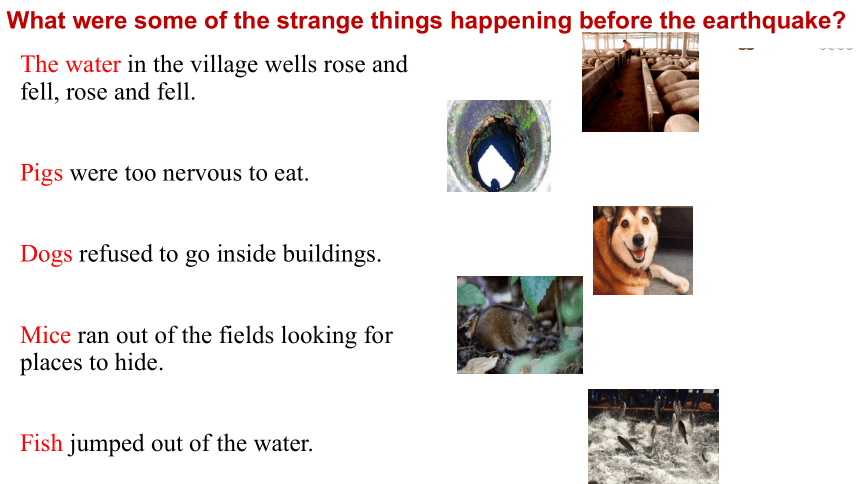
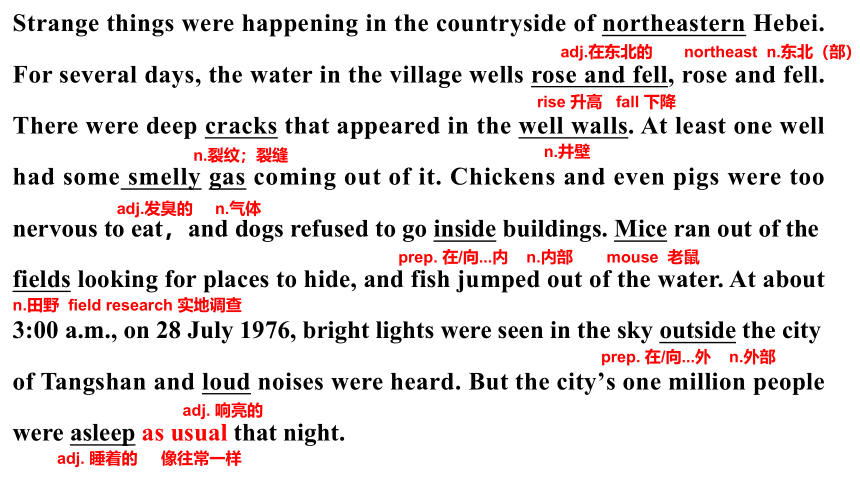
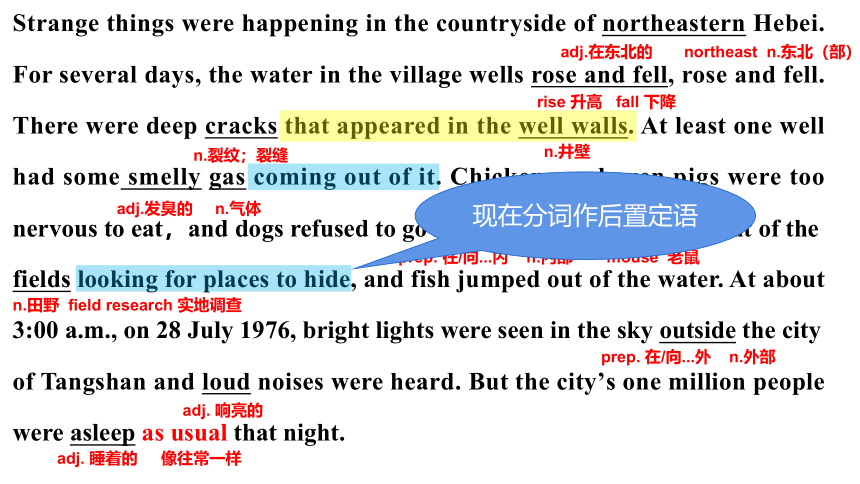
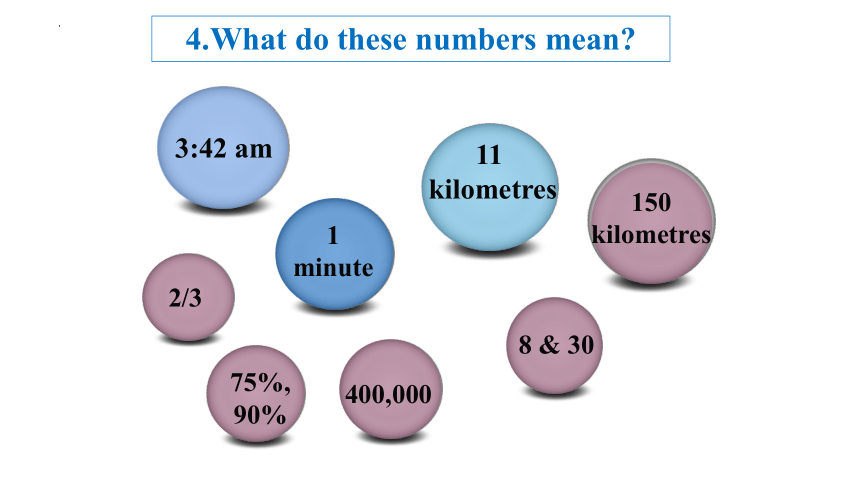
文档简介
(共27张PPT)
1. What’s the main idea of the passage
The passage mainly talks about a/an ___________(what) that happened in
_________ (where) in ______(when).
event
place
time
2. In what order is the text written
A.Time B.Space C.Feeling
Step 2.Fast-Reading
Warning signs before the earthquake.
The earthquake happened and caused deaths and injuries in Tangshan.
Tangshan came back to life again.
Para.1
Para.4
Para.3
Para.2
1.Match the main ideas with each paragraph.
Para.5
The earthquake caused unbelievable destruction to Tangshan.
Help came soon after the quakes.
Step 3.Careful-reading
1. What’s the main idea of the passage
The passage mainly talks about a/an ___________(what) that happened in
_________ (where) in ______(when).
event
place
time
earthquake
Tangshan
1976
2. In what order is the text written
A.Time B.Space C.Feeling
Step 2.Fast-Reading
Warning signs before the earthquake.
The earthquake happened and caused deaths and injuries in Tangshan.
Tangshan came back to life again.
Para.1
Para.4
Para.3
Para.2
1.Listen and match the main ideas with each paragraph.
Para.5
The earthquake caused unbelievable destruction to Tangshan.
Help came soon after the quakes.
Step 3.Careful-reading
The water in the village wells rose and fell, rose and fell.
Pigs were too nervous to eat.
Dogs refused to go inside buildings.
Mice ran out of the fields looking for places to hide.
Fish jumped out of the water.
What were some of the strange things happening before the earthquake
Strange things were happening in the countryside of northeastern Hebei. For several days, the water in the village wells rose and fell, rose and fell. There were deep cracks that appeared in the well walls. At least one well had some smelly gas coming out of it. Chickens and even pigs were too nervous to eat,and dogs refused to go inside buildings. Mice ran out of the fields looking for places to hide, and fish jumped out of the water. At about 3:00 a.m., on 28 July 1976, bright lights were seen in the sky outside the city of Tangshan and loud noises were heard. But the city’s one million people were asleep as usual that night.
adj.在东北的 northeast n.东北(部)
rise 升高 fall 下降
n.裂纹;裂缝
n.井壁
adj.发臭的
n.气体
prep. 在/向...内 n.内部
mouse 老鼠
n.田野 field research 实地调查
adj. 响亮的
adj. 睡着的
像往常一样
prep. 在/向...外 n.外部
Strange things were happening in the countryside of northeastern Hebei. For several days, the water in the village wells rose and fell, rose and fell. There were deep cracks that appeared in the well walls. At least one well had some smelly gas coming out of it. Chickens and even pigs were too nervous to eat,and dogs refused to go inside buildings. Mice ran out of the fields looking for places to hide, and fish jumped out of the water. At about 3:00 a.m., on 28 July 1976, bright lights were seen in the sky outside the city of Tangshan and loud noises were heard. But the city’s one million people were asleep as usual that night.
adj.在东北的 northeast n.东北(部)
rise 升高 fall 下降
n.裂纹;裂缝
n.井壁
adj.发臭的
n.气体
prep. 在/向...内 n.内部
mouse 老鼠
n.田野 field research 实地调查
adj. 响亮的
adj. 睡着的
像往常一样
prep. 在/向...外 n.外部
现在分词作后置定语
4.What do these numbers mean
1 minute
150
kilometres
8 & 30
2/3
75%, 90%
400,000
3:42 am
11
kilometres
Why did the writer use so many numbers in the text
To show the earthquake was very serious and it caused a lot of damage to people and the city.
At 3:42 a.m., everything began to shake. It seemed as if the world were coming to an end! Eleven kilometres directly below the city, one of the most deadly earthquakes of the 20th century had begun, a quake that even caused damage more than 150 kilometres away in Beijing. Nearly one third of the whole nation felt it! A huge crack, eight kilometres long and 30 metres wide, cut across houses, roads, and waterways. Hard hills of rock became rivers of dirt. In less than one minute, a large city lay in ruins. Two thirds of the people who lived there were dead or injured. Thousands of children were left without parents. The number of people who were killed or badly injured in the quake was more than 400,000.
似乎,好像
结束
直接地;恰好
裂缝
横跨
lie in ruins沦为废墟
Chickens and even pigs were too nervous to eat, and dogs refused to go inside buildings.
too … to …
太……以至于不能……
① He's far too young to go on his own.
② It's too late to do anything about it now.
③ My coffee is too hot to drink.
鸡甚至猪都焦躁不安,不愿进食;狗拒绝进入屋内。
他年纪太小,不能独自一人去。
现在进行任何补救都为时过晚。
我的咖啡太烫,不能喝。
Translation
1.你还太小, 不能上学。
2.箱子太重,小男孩拎不起。
3.这件连衣裙太紧了,不能穿。
You are too young to go to school.
The box is too heavy for the boy to carry.
The dress is too tight to wear.
At 3:42 a.m., everything began to shake. It seemed as if the world were coming to an end! Eleven kilometres directly below the city, one of the most deadly earthquakes of the 20th century had begun, a quake that even caused damage more than 150 kilometres away in Beijing. Nearly one third of the whole nation felt it! A huge crack, eight kilometres long and 30 metres wide, cut across houses, roads, and waterways. Hard hills of rock became rivers of dirt. In less than one minute, a large city lay in ruins. Two thirds of the people who lived there were dead or injured. Thousands of children were left without parents. The number of people who were killed or badly injured in the quake was more than 400,000.
似乎,好像
结束
直接地;恰好
裂缝
横跨
lie in ruins 沦为废墟
泥土;尘土
泥石流
Nearly one third of the whole nation felt it!
one third
全国几乎三分之一的地区均有震感!
① If an apple is cut into six equal slices, each
slice is called one sixth.
② Five forths of the earth is covered by water.
③ Two thirds of the volunteers are boys.
如果一个苹果被平分为六块,每块就是六分之一。
五分之四的地球表面被水覆盖。
三分之二的志愿者是男生。
三分之一
英语中分数词由基数词和序数词构成,分子用基数词(one, two, …),分母用序数词(first, second, …)。当分子大于一时,分母用复数。
分数后不能直接跟名词或代词,而是跟"of+冠词/限定词+名词/代词",其后的谓语动词与后面的名词或代词在人称和数上保持一致。
Fill in the blanks with correct phrases.
1. _________(五分之一) of people were
injured in the earthquake.
2. __________ (三分之二) of the students in
our class are girls.
3. He has read ____________(四分之三) of
the book.
Two thirds
One fifth
three fourths
in ruins
destroyed or severely damaged
毁坏;严重受损;破败不堪
① Years of fighting have left the area in ruins.
② The scandal(丑闻) left his reputation in ruins.
经年的战事已经使得这个地区满目疮痍。
这件丑闻使他身败名裂。
leave
使处于(某种状态)
leave sb/sth doing/done/adj/adv
① Don’t leave the water ________while you brush your teeth. (run)
② He got up late and hurried to his office, leaving the breakfast untouched.
③Running a marathon will leave you breathless.
当你刷牙时别让水一直流淌。
他起晚了,然后匆忙赶到办公室,早饭根本没动。
跑一场马拉松会让你上气不接下气。
running
At 3:42 a.m., everything began to shake. It seemed as if the world were coming to an end! Eleven kilometres directly below the city, one of the most deadly earthquakes of the 20th century had begun, a quake that even caused damage more than 150 kilometres away in Beijing. Nearly one third of the whole nation felt it! A huge crack, eight kilometres long and 30 metres wide, cut across houses, roads, and waterways. Hard hills of rock became rivers of dirt. In less than one minute, a large city lay in ruins. Two thirds of the people who lived there were dead or injured. Thousands of children were left without parents. The number of people who were killed or badly injured in the quake was more than 400,000.
似乎,好像
结束
直接地;恰好
裂缝
横跨
lie in ruins 沦为废墟
泥土;尘土
泥石流
Everywhere survivors looked, there was nothing but ruins. Nearly everything in the city was destroyed. About 75 percent of the city’s factories and buildings, 90 percent of its homes, and all of its hospitals were gone. Bricks covered the ground like red autumn leaves, but no wind could blow them away. Most bridges had fallen or were not safe to cross. The railway tracks were now useless pieces of metal. Tens of thousands of cows, hundreds of thousands of pigs, and millions of chickens were dead. Sand now filled the wells instead of water. People were in shock—and then, later that afternoon, another big quake shook Tangshan again. Even more buildings fell down. Water, food, and electricity were hard to get. People began to wonder how long the disaster would last.
blow away 吹走 blow-blew-blown
铁路轨道
金属碎片
simile 明喻 (like, as, seem, as if)
hyperbole 夸张
adj.另一的
vt. 使摇动 shake-shook-shaken
vt.想知道 n.奇迹(s)
持续
fall down 摔倒,倒塌
fall-fell-fallen
I was sad to see litter everywhere.
看到到处都是垃圾,我很难过。
I saw her picture everywhere.
我到处看到她的照片。
People are creating art everywhere you look.
你看到的每一个地方都有人在创作艺术。
翻译:
无论他走到哪里,他都收到热烈欢迎。
________________________________________________
everywhere
adv.到处 conj.所有地方
Everywhere he went, he received a warm welcome.
1. I have nothing but an old house.
我只有一座破房子。
2. We have nothing to do but wait here.
我们只好在这里等。
3. He has nothing to choose but leave here.
他没别的选择,只好离开这里。
nothing but
除……外,什么也没有;只有
People were in shock — and then, later that afternoon, another big quake shook Tangshan again.
in shock
震惊;吃惊
(作表语、作状语、作宾语补足语)
① News of the murder left us all in shock.
② I looked at my husband in shock, waiting for him to tell me what happened.
谋杀的消息让我们都很震惊。
我震惊地望着丈夫,期待他告诉我发生了什么。
Everywhere survivors looked, there was nothing but ruins. Nearly everything in the city was destroyed. About 75 percent of the city’s factories and buildings, 90 percent of its homes, and all of its hospitals were gone. Bricks covered the ground like red autumn leaves, but no wind could blow them away. Most bridges had fallen or were not safe to cross. The railway tracks were now useless pieces of metal. Tens of thousands of cows, hundreds of thousands of pigs, and millions of chickens were dead. Sand now filled the wells instead of water. People were in shock—and then, later that afternoon, another big quake shook Tangshan again. Even more buildings fell down. Water, food, and electricity were hard to get. People began to wonder how long the disaster would last.
blow away 吹走 blow-blew-blown
铁路轨道
金属碎片
simile 明喻 (like, as, seem, as if)
hyperbole 夸张
adj.另一的
vt. 使摇动 shake-shook-shaken
vt.想知道 n.奇迹(s)
持续
fall down 摔倒,倒塌
fall-fell-fallen
But hope was not lost. Soon after the quakes, the army sent 150000 soldiers to Tangshan to dig out those who were trapped and to bury the dead. More than 10000 doctors and nurses came to provide medical care. Workers built shelters for survivors whose homes had been destroyed. Hundreds of thousands of people were helped. Water and food were brought into the city by train, truck, and plane. Slowly, the city began to breathe again.
personification 拟人
掘出;查出
(revive/back to life)
the rich
富人
the poor
穷人
the old
老年人
the young
年轻人
the sick
病人
the unknown
未知的事物
the new
新事物
the + adj.
表示某一类人或者某一类事物
Tangshan started to revive itself and get back up on its feet. With strong support from the government and the tireless efforts of the city’s people,a new Tangshan was built upon the earthquake ruins. The new city has become a home to more than seven million people,with great improvements in transportation,industry,and environment. Tangshan city has proved to China and the rest of the world that in times of disaster,people must unify and show the wisdom to stay positive and rebuild for a brighter future.
复苏;复活
get back up on one’s feet 重新站起来
adj.不知疲倦的
prep. 在...之上
...的家
prove to 向...证明
在...时期
统一;成一体
1. What’s the main idea of the passage
The passage mainly talks about a/an ___________(what) that happened in
_________ (where) in ______(when).
event
place
time
2. In what order is the text written
A.Time B.Space C.Feeling
Step 2.Fast-Reading
Warning signs before the earthquake.
The earthquake happened and caused deaths and injuries in Tangshan.
Tangshan came back to life again.
Para.1
Para.4
Para.3
Para.2
1.Match the main ideas with each paragraph.
Para.5
The earthquake caused unbelievable destruction to Tangshan.
Help came soon after the quakes.
Step 3.Careful-reading
1. What’s the main idea of the passage
The passage mainly talks about a/an ___________(what) that happened in
_________ (where) in ______(when).
event
place
time
earthquake
Tangshan
1976
2. In what order is the text written
A.Time B.Space C.Feeling
Step 2.Fast-Reading
Warning signs before the earthquake.
The earthquake happened and caused deaths and injuries in Tangshan.
Tangshan came back to life again.
Para.1
Para.4
Para.3
Para.2
1.Listen and match the main ideas with each paragraph.
Para.5
The earthquake caused unbelievable destruction to Tangshan.
Help came soon after the quakes.
Step 3.Careful-reading
The water in the village wells rose and fell, rose and fell.
Pigs were too nervous to eat.
Dogs refused to go inside buildings.
Mice ran out of the fields looking for places to hide.
Fish jumped out of the water.
What were some of the strange things happening before the earthquake
Strange things were happening in the countryside of northeastern Hebei. For several days, the water in the village wells rose and fell, rose and fell. There were deep cracks that appeared in the well walls. At least one well had some smelly gas coming out of it. Chickens and even pigs were too nervous to eat,and dogs refused to go inside buildings. Mice ran out of the fields looking for places to hide, and fish jumped out of the water. At about 3:00 a.m., on 28 July 1976, bright lights were seen in the sky outside the city of Tangshan and loud noises were heard. But the city’s one million people were asleep as usual that night.
adj.在东北的 northeast n.东北(部)
rise 升高 fall 下降
n.裂纹;裂缝
n.井壁
adj.发臭的
n.气体
prep. 在/向...内 n.内部
mouse 老鼠
n.田野 field research 实地调查
adj. 响亮的
adj. 睡着的
像往常一样
prep. 在/向...外 n.外部
Strange things were happening in the countryside of northeastern Hebei. For several days, the water in the village wells rose and fell, rose and fell. There were deep cracks that appeared in the well walls. At least one well had some smelly gas coming out of it. Chickens and even pigs were too nervous to eat,and dogs refused to go inside buildings. Mice ran out of the fields looking for places to hide, and fish jumped out of the water. At about 3:00 a.m., on 28 July 1976, bright lights were seen in the sky outside the city of Tangshan and loud noises were heard. But the city’s one million people were asleep as usual that night.
adj.在东北的 northeast n.东北(部)
rise 升高 fall 下降
n.裂纹;裂缝
n.井壁
adj.发臭的
n.气体
prep. 在/向...内 n.内部
mouse 老鼠
n.田野 field research 实地调查
adj. 响亮的
adj. 睡着的
像往常一样
prep. 在/向...外 n.外部
现在分词作后置定语
4.What do these numbers mean
1 minute
150
kilometres
8 & 30
2/3
75%, 90%
400,000
3:42 am
11
kilometres
Why did the writer use so many numbers in the text
To show the earthquake was very serious and it caused a lot of damage to people and the city.
At 3:42 a.m., everything began to shake. It seemed as if the world were coming to an end! Eleven kilometres directly below the city, one of the most deadly earthquakes of the 20th century had begun, a quake that even caused damage more than 150 kilometres away in Beijing. Nearly one third of the whole nation felt it! A huge crack, eight kilometres long and 30 metres wide, cut across houses, roads, and waterways. Hard hills of rock became rivers of dirt. In less than one minute, a large city lay in ruins. Two thirds of the people who lived there were dead or injured. Thousands of children were left without parents. The number of people who were killed or badly injured in the quake was more than 400,000.
似乎,好像
结束
直接地;恰好
裂缝
横跨
lie in ruins沦为废墟
Chickens and even pigs were too nervous to eat, and dogs refused to go inside buildings.
too … to …
太……以至于不能……
① He's far too young to go on his own.
② It's too late to do anything about it now.
③ My coffee is too hot to drink.
鸡甚至猪都焦躁不安,不愿进食;狗拒绝进入屋内。
他年纪太小,不能独自一人去。
现在进行任何补救都为时过晚。
我的咖啡太烫,不能喝。
Translation
1.你还太小, 不能上学。
2.箱子太重,小男孩拎不起。
3.这件连衣裙太紧了,不能穿。
You are too young to go to school.
The box is too heavy for the boy to carry.
The dress is too tight to wear.
At 3:42 a.m., everything began to shake. It seemed as if the world were coming to an end! Eleven kilometres directly below the city, one of the most deadly earthquakes of the 20th century had begun, a quake that even caused damage more than 150 kilometres away in Beijing. Nearly one third of the whole nation felt it! A huge crack, eight kilometres long and 30 metres wide, cut across houses, roads, and waterways. Hard hills of rock became rivers of dirt. In less than one minute, a large city lay in ruins. Two thirds of the people who lived there were dead or injured. Thousands of children were left without parents. The number of people who were killed or badly injured in the quake was more than 400,000.
似乎,好像
结束
直接地;恰好
裂缝
横跨
lie in ruins 沦为废墟
泥土;尘土
泥石流
Nearly one third of the whole nation felt it!
one third
全国几乎三分之一的地区均有震感!
① If an apple is cut into six equal slices, each
slice is called one sixth.
② Five forths of the earth is covered by water.
③ Two thirds of the volunteers are boys.
如果一个苹果被平分为六块,每块就是六分之一。
五分之四的地球表面被水覆盖。
三分之二的志愿者是男生。
三分之一
英语中分数词由基数词和序数词构成,分子用基数词(one, two, …),分母用序数词(first, second, …)。当分子大于一时,分母用复数。
分数后不能直接跟名词或代词,而是跟"of+冠词/限定词+名词/代词",其后的谓语动词与后面的名词或代词在人称和数上保持一致。
Fill in the blanks with correct phrases.
1. _________(五分之一) of people were
injured in the earthquake.
2. __________ (三分之二) of the students in
our class are girls.
3. He has read ____________(四分之三) of
the book.
Two thirds
One fifth
three fourths
in ruins
destroyed or severely damaged
毁坏;严重受损;破败不堪
① Years of fighting have left the area in ruins.
② The scandal(丑闻) left his reputation in ruins.
经年的战事已经使得这个地区满目疮痍。
这件丑闻使他身败名裂。
leave
使处于(某种状态)
leave sb/sth doing/done/adj/adv
① Don’t leave the water ________while you brush your teeth. (run)
② He got up late and hurried to his office, leaving the breakfast untouched.
③Running a marathon will leave you breathless.
当你刷牙时别让水一直流淌。
他起晚了,然后匆忙赶到办公室,早饭根本没动。
跑一场马拉松会让你上气不接下气。
running
At 3:42 a.m., everything began to shake. It seemed as if the world were coming to an end! Eleven kilometres directly below the city, one of the most deadly earthquakes of the 20th century had begun, a quake that even caused damage more than 150 kilometres away in Beijing. Nearly one third of the whole nation felt it! A huge crack, eight kilometres long and 30 metres wide, cut across houses, roads, and waterways. Hard hills of rock became rivers of dirt. In less than one minute, a large city lay in ruins. Two thirds of the people who lived there were dead or injured. Thousands of children were left without parents. The number of people who were killed or badly injured in the quake was more than 400,000.
似乎,好像
结束
直接地;恰好
裂缝
横跨
lie in ruins 沦为废墟
泥土;尘土
泥石流
Everywhere survivors looked, there was nothing but ruins. Nearly everything in the city was destroyed. About 75 percent of the city’s factories and buildings, 90 percent of its homes, and all of its hospitals were gone. Bricks covered the ground like red autumn leaves, but no wind could blow them away. Most bridges had fallen or were not safe to cross. The railway tracks were now useless pieces of metal. Tens of thousands of cows, hundreds of thousands of pigs, and millions of chickens were dead. Sand now filled the wells instead of water. People were in shock—and then, later that afternoon, another big quake shook Tangshan again. Even more buildings fell down. Water, food, and electricity were hard to get. People began to wonder how long the disaster would last.
blow away 吹走 blow-blew-blown
铁路轨道
金属碎片
simile 明喻 (like, as, seem, as if)
hyperbole 夸张
adj.另一的
vt. 使摇动 shake-shook-shaken
vt.想知道 n.奇迹(s)
持续
fall down 摔倒,倒塌
fall-fell-fallen
I was sad to see litter everywhere.
看到到处都是垃圾,我很难过。
I saw her picture everywhere.
我到处看到她的照片。
People are creating art everywhere you look.
你看到的每一个地方都有人在创作艺术。
翻译:
无论他走到哪里,他都收到热烈欢迎。
________________________________________________
everywhere
adv.到处 conj.所有地方
Everywhere he went, he received a warm welcome.
1. I have nothing but an old house.
我只有一座破房子。
2. We have nothing to do but wait here.
我们只好在这里等。
3. He has nothing to choose but leave here.
他没别的选择,只好离开这里。
nothing but
除……外,什么也没有;只有
People were in shock — and then, later that afternoon, another big quake shook Tangshan again.
in shock
震惊;吃惊
(作表语、作状语、作宾语补足语)
① News of the murder left us all in shock.
② I looked at my husband in shock, waiting for him to tell me what happened.
谋杀的消息让我们都很震惊。
我震惊地望着丈夫,期待他告诉我发生了什么。
Everywhere survivors looked, there was nothing but ruins. Nearly everything in the city was destroyed. About 75 percent of the city’s factories and buildings, 90 percent of its homes, and all of its hospitals were gone. Bricks covered the ground like red autumn leaves, but no wind could blow them away. Most bridges had fallen or were not safe to cross. The railway tracks were now useless pieces of metal. Tens of thousands of cows, hundreds of thousands of pigs, and millions of chickens were dead. Sand now filled the wells instead of water. People were in shock—and then, later that afternoon, another big quake shook Tangshan again. Even more buildings fell down. Water, food, and electricity were hard to get. People began to wonder how long the disaster would last.
blow away 吹走 blow-blew-blown
铁路轨道
金属碎片
simile 明喻 (like, as, seem, as if)
hyperbole 夸张
adj.另一的
vt. 使摇动 shake-shook-shaken
vt.想知道 n.奇迹(s)
持续
fall down 摔倒,倒塌
fall-fell-fallen
But hope was not lost. Soon after the quakes, the army sent 150000 soldiers to Tangshan to dig out those who were trapped and to bury the dead. More than 10000 doctors and nurses came to provide medical care. Workers built shelters for survivors whose homes had been destroyed. Hundreds of thousands of people were helped. Water and food were brought into the city by train, truck, and plane. Slowly, the city began to breathe again.
personification 拟人
掘出;查出
(revive/back to life)
the rich
富人
the poor
穷人
the old
老年人
the young
年轻人
the sick
病人
the unknown
未知的事物
the new
新事物
the + adj.
表示某一类人或者某一类事物
Tangshan started to revive itself and get back up on its feet. With strong support from the government and the tireless efforts of the city’s people,a new Tangshan was built upon the earthquake ruins. The new city has become a home to more than seven million people,with great improvements in transportation,industry,and environment. Tangshan city has proved to China and the rest of the world that in times of disaster,people must unify and show the wisdom to stay positive and rebuild for a brighter future.
复苏;复活
get back up on one’s feet 重新站起来
adj.不知疲倦的
prep. 在...之上
...的家
prove to 向...证明
在...时期
统一;成一体
